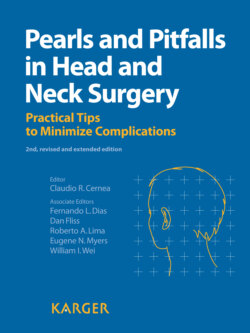Читать книгу Pearls and Pitfalls in Head and Neck Surgery - Группа авторов - Страница 13
На сайте Литреса книга снята с продажи.
ОглавлениеThyroid and Parathyroid Glands
Cernea CR, Dias FL, Fliss D, Lima RA, Myers EN, Wei WI (eds): Pearls and Pitfalls in Head and Neck Surgery. Basel, Karger, 2012, pp 14–15
DOI: 10.1159/000337467
1.7 When to Perform an Intraoperative Frozen Section Examination in Thyroid Surgery
Jeremy L. Freeman Teresa Kroeker
Otolaryngology Head Neck Surgery, Mount Sinai Hospital, University of Toronto, Toronto, Ont., Canada
P E A R L S
• Frozen section is useful in determining lymphatic metastases, invasiveness, and adequacy of resection margins, as well as confirming parathyroid tissue.
• Frozen section is dependent on the skill of the pathologist.
• Frozen section may identify cancer in a significant number of patients.
• Frozen section may be cost-effective.
• If the malignancy is correctly diagnosed, frozen section may help avoid second operations.
• False positives are rare.
P I T F A L L S
• Neophytes or pathologists unfamiliar with thyroid pathology may not be accurate or helpful.
• There will be a number of false negatives, so clinical acumen of the surgeon is important, especially in making a decision about completion surgery which may have to be based on other risk factors.
• Frozen section may be very unreliable in the diagnosis of anaplastic carcinoma or lymphoma.
Introduction
The utilization of frozen section examination during a thyroid operation is variable and controversial worldwide. The general indications for frozen section are the following:
to ascertain the presence of malignancy in a solitary thyroid nodule with a view to performing a total thyroidectomy at the same operation;
to determine the presence of metastatic nodes with a view to performing a lymphadenectomy;
to determine the extent of invasiveness or adequacy of resection for invasive thyroid malignancies;
to confirm tissue believed to be parathyroid so such tissue may be autoimplanted; and
to confirm the presence of anaplastic carcinoma or lymphoma in order to abort surgery.
Indications 2, 3, and 4 would meet with few arguments. Lymph nodes with any hint of thyroid tissue within the substance are metastatic. Invasiveness and resection margins are important to ascertain that the tumor has been surgically extirpated in a correct oncological manner. Parathyroid tissue that is to be implanted should be validated, especially when there is a neophyte surgeon with limited experience in the visual identification of the parathyroid.
The diagnosis of anaplastic carcinoma and lymphoma may be exceedingly difficult for the pathologist and often the clinical impression will have to supersede the pathology.
Practical Tips
There are varying and disparate opinions (many with evidence based only on institutional studies) regarding frozen section for determination of malignancy in the solitary nodule undergoing subtotal surgery, especially with respect to well-differentiated thyroid cancer. However, one must bear in mind that histopathology is subjective and also depends on the experience of the pathologist, hence the variable reports.
On one hand, many reports state that frozen section is a useless exercise which cannot make a firm intraoperative diagnosis of malignancy in nodular disease [1, 2]. Furthermore, it is reported that this is not cost-effective [3]. Conversely, others say that the diagnosis can be made in a significant number of cases, it is cost-effective to the extent that it avoids a second operation in those correctly identified as malignant, and that in the latter group it is psychologically advantageous to avoid that second surgery [4, 5].
There may be a number of false-negative reports, necessitating decision-making regarding further management well after the surgery - in these cases, nothing would have been lost. False positives should be rare.
Due to the pathologists' good record at diagnosis on frozen section at our institution, we have adopted the following indications for frozen section request for solitary nodular disease: (a) benign or indeterminate nodule diagnosed on fine needle aspiration, and (b) atypical nodule (NCI classification) with no other major risk factors for malignancy [6].
Our results have an acceptable diagnostic yield attesting to the cost-effectiveness of this maneuver. For those patients correctly diagnosed, there is a significant psychological advantage in avoiding a second surgery.
Conclusions
There are several accepted indications for frozen section examination in thyroid surgery. The most controversial is its use for the patient with a solitary nodule undergoing subtotal surgery. If the institutional pathologists are reliable, one can safely depend on the frozen section in a significant number of cases. This is cost-effective and psychologically advantageous.
References
1 Lin HS, Komisar A, Opher E, Blaugrund SM: Surgical management of thyroid masses: assessing the need for frozen section. Laryngoscope 1999;109:868–873.
2 Davoudi MM, Yeh KA, Wei JP: Utility of fine-needle aspiration cytology and frozen-section examination in the operative management of thyroid nodules. Am Surg 1997;63:1084–1089.
3 McHenry CR, Raeburn C, Strickland T, Marty JJ: The utility of routine frozen section examination for intraoperative diagnosis of thyroid cancer. Am J Surg 1996;172:658–661.
4 Lai P, Segall L, de Korompay N, Witterick I, Freeman J: Costanalysis of intraoperative frozen section examinations in thyroid surgery in a Canadian tertiary center. J Otolaryngol Head Neck Surg 2009;38:559–563.
5 Roach JC, Heller KS, Dubner S, Sznyter LA: The value of frozen section examinations in determining the extent of thyroid surgery in patients with indeterminate fine-needle aspiration cytology. Arch Otolaryngol Head Neck Surg 2002;128:263–267.
6 Baloch ZW, Cibas ES, Clark DP, Layfield LJ, Ljung B, Pitman MB, Abati A: The National Cancer Institute Thyroid fine needle aspiration state of the science conference: a summation. Cytojournal 2008;5:6.
Jeremy L. Freeman, MD, FRCSC, FACS
Professor of Otolaryngology-Head and
Neck Surgery
Professor of Surgery
University of Toronto
Temmy Latner/Dynacare Chair in
Head and Neck Oncology
Otolaryngologist-in-Chief
Mount Sinai Hospital
600 University Avenue, Suite 401
Toronto, ON M5G 1X5 (Canada)
E-Mail JFreeman@mtsinai.on.ca
